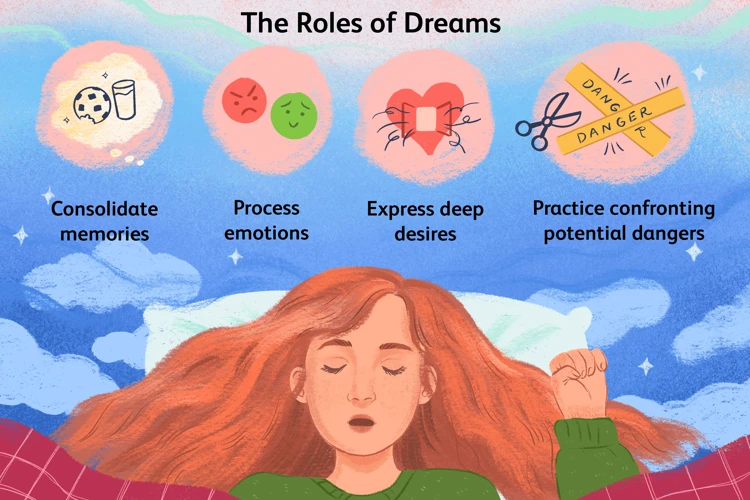Recurring dreams have long fascinated and puzzled individuals, offering glimpses into the depths of the subconscious mind. These puzzling experiences can hold valuable insights about ourselves and the pursuit of personal growth. Through repetitive symbols, emotions, and narratives, recurring dreams function as a powerful tool for self-reflection and exploration. By delving into their significance and interpreting their hidden meanings, we can unlock profound understanding about our unresolved issues, unrequited desires, and untapped potential. In this article, we will navigate the intricate role of recurring dreams in self-reflection and personal growth, uncovering the transformative power they hold.
Definition of Recurring Dreams

The definition of recurring dreams revolves around their repetitive nature, where the same dream or similar elements occur repeatedly over a period of time. These dreams tend to reemerge with consistency, often featuring similar scenarios, characters, or themes. Unlike regular dreams that may fade from memory upon awakening, recurring dreams leave a lasting impression, causing the dreamer to take notice and seek understanding. These dreams can occur nightly, weekly, monthly, or at irregular intervals, impacting the dreamer’s thoughts during waking hours. Recurring dreams can vary in intensity and vividness, but they consistently recur, highlighting their importance and the need for interpretation. These dreams often stand out from ordinary dreams due to the prominence and frequency of their occurrence, signaling a deeper significance that warrants exploration and analysis. It is intriguing to examine why certain dreams tend to repeat themselves, as this repetition carries hidden messages and insights about our subconscious desires, fears, and unresolved issues. By understanding the unique nature of recurring dreams, individuals can embark on a profound journey of self-discovery and personal growth.
Importance of Dreams in Self-Reflection

Dreams play a crucial role in self-reflection, offering a unique and powerful avenue for exploring our inner thoughts, emotions, and experiences. They serve as a gateway to the subconscious mind, providing a rich tapestry of symbolism, metaphors, and narratives that reflect our deepest desires, fears, and unresolved issues. Dreams offer a safe space to process and make sense of our experiences, helping us gain insight into aspects of ourselves that may be hidden or repressed in our waking lives. Through dreams, we can explore and confront unresolved conflicts, past traumas, and unexpressed emotions, facilitating healing and personal growth. Dreams also provide a platform for creativity and exploration, allowing us to tap into our innate talents, passions, and intuition. By paying attention to our dreams and engaging in self-reflection, we can harness the transformative power of this inner realm and uncover the wisdom it holds. Whether through recurring dreams or one-time occurrences, our dreams serve as a powerful tool for self-discovery and self-awareness, guiding us on a journey of personal growth and self-actualization. To further explore the importance of dreams in self-reflection, you can read more about the impact of recurring dreams on past trauma or discover tips for breaking the cycle of recurring dreams.
Significance of Recurring Dreams

Recurring dreams hold great significance as they provide valuable insights into our inner world and can serve as a catalyst for self-reflection and personal growth. The repetition of these dreams allows us to identify patterns and themes that may be deeply rooted in our subconscious mind. By recognizing these recurring elements, we gain a deeper understanding of our thoughts, emotions, and experiences. Additionally, recurring dreams can help us deepen our self-awareness, shedding light on aspects of ourselves that may be hidden or overlooked. They often serve as a reminder of unresolved issues and emotional wounds that require attention and healing. Through the analysis and interpretation of the symbolism and metaphors present in recurring dreams, we can access the wisdom of our subconscious and uncover valuable guidance. Seeking assistance from dream interpretation resources or professionals can further enhance our understanding of these dreams. Ultimately, by embracing and engaging with recurring dreams, we open ourselves up to transformative personal growth and self-discovery. (Source: significance-frequency-recurring-dreams)
1. Identifying Patterns and Themes
Identifying patterns and themes within recurring dreams is a crucial step in understanding their significance. By closely examining the recurring elements, symbols, and narratives present in these dreams, individuals can gain valuable insights into their underlying messages. One way to identify patterns is by keeping a dream journal, recording the details of each recurring dream. This allows for a comprehensive analysis and comparison of the dreams over time. Paying attention to common symbols or themes that arise can provide clues about the deeper meaning behind these dreams. For example, recurring dreams about falling may represent a sense of insecurity or a fear of losing control in waking life. On the other hand, dreams about flying might indicate a desire for freedom and liberation. By recognizing and analyzing these recurring motifs, individuals can uncover recurring emotions, conflicts, or desires that need attention and resolution. Identifying patterns and themes within recurring dreams enables individuals to gain a deeper understanding of themselves and their subconscious mind’s messages.
2. Deepening Self-Awareness
Deepening self-awareness is one of the significant benefits of exploring recurring dreams. These repetitive dreams often contain symbols, themes, and emotions that reflect our subconscious thoughts and experiences. By examining these recurring elements, we can gain valuable insights into our true selves. One way to deepen self-awareness through recurring dreams is by keeping a dream journal, noting down the details of each dream upon waking. This practice helps us identify patterns and recurring themes. Regularly reviewing the journal reveals trends and allows us to reflect on the messages our subconscious is trying to convey. Additionally, discussing recurring dreams with a therapist or a trusted friend can provide an external perspective and deeper understanding. Through these steps, we can develop a heightened sense of self-awareness, identifying our desires, fears, and areas for personal growth. The process of delving into recurring dreams encourages introspection and stimulates a deeper understanding of our inner thoughts and emotions.
3. Unresolved Issues and Emotional Healing
Unresolved issues and emotional healing play a significant role in recurring dreams. These dreams often act as a reflection of our subconscious mind, bringing to the surface unresolved emotions, traumas, or past experiences. Through the repetition of these dreams, our subconscious urges us to confront and address these unresolved issues in order to promote emotional healing and growth. Recurring dreams related to unresolved issues can vary in their content, such as reliving a past conflict, encountering familiar faces from our past, or experiencing situations that trigger intense emotions. Each recurrence of the dream provides an opportunity for us to delve deeper into the root causes of our emotional turmoil. By exploring and processing these unresolved issues within the context of our recurring dreams, we can begin to find closure, release trapped emotions, and initiate the healing process. This emotional healing can take various forms, including forgiveness, acceptance, or self-compassion. Through understanding and acknowledging the significance of recurring dreams in uncovering unresolved emotions, we allow ourselves the chance to experience profound personal growth and healing.
Interpreting Recurring Dreams

Interpreting recurring dreams can be a fascinating and enlightening process that unveils the hidden meanings and symbols embedded within these repetitive experiences. To decipher the messages and insights offered by recurring dreams, it is essential to engage in a thoughtful analysis of their symbolism and metaphors. These dreams often use powerful imagery to represent deeper emotions, desires, and unresolved issues. By examining the recurring symbols and their personal significance, individuals can gain a deeper understanding of themselves and their subconscious mind. Additionally, seeking guidance from the subconscious mind itself can provide valuable insights. This can be accomplished through techniques such as lucid dreaming or dream journaling. Resources such as dream interpretation books or websites can also offer valuable perspectives and interpretations. By embarking on the journey of interpreting recurring dreams, individuals can tap into their subconscious wisdom and use these dreams as a tool for self-reflection and personal growth.
1. Analyzing Symbolism and Metaphors
Analyzing symbolism and metaphors is a key aspect of interpreting recurring dreams. Recurring dreams often contain vivid and powerful symbols that carry deeper meanings. These symbols can be personal, cultural, or archetypal in nature, representing different aspects of the dreamer’s psyche. By closely examining and decoding these symbols, individuals can gain valuable insights into their subconscious thoughts and emotions. It is crucial to approach symbolism with an open and curious mind, as the interpretation may differ from person to person. For example, a snake in a recurring dream could symbolize transformation, fear, or hidden desires depending on the dreamer’s personal experiences and associations. Similarly, a recurring dream about a house might represent the dreamer’s sense of self or the different rooms symbolizing various aspects of their life. Metaphors within recurring dreams can also offer profound insights. For instance, being lost in a maze may metaphorically reflect the dreamer’s feelings of confusion or being trapped in a challenging situation. By carefully analyzing these symbols and metaphors, individuals can unlock the hidden messages and guidance embedded within their recurring dreams. Understanding the symbolic language of dreams can lead to self-discovery, personal growth, and a deeper connection with the subconscious mind.
2. Seeking Guidance From the Subconscious Mind
Seeking guidance from the subconscious mind is a key aspect of interpreting recurring dreams. These dreams provide a direct line of communication with our subconscious, allowing us to tap into its wisdom and insights. Our subconscious mind holds a wealth of knowledge and understanding that may not be easily accessible during waking hours. However, through recurring dreams, this hidden reservoir of information can be brought to the forefront. When analyzing these dreams, it is important to pay attention to the emotions, symbols, and narratives that emerge. These elements serve as clues that can help unravel the messages our subconscious is trying to convey. By delving into the dream’s symbolism and reflecting on its meaning, we can gain valuable insights and guidance. Our subconscious mind often knows what is best for us and can offer solutions to our problems or dilemmas. Seeking guidance from the subconscious mind through recurring dreams helps us tap into our intuition and make better decisions in our waking life. It provides a unique opportunity to access the deeper layers of our psyche and gain a clearer understanding of ourselves and our path forward.
3. Consulting Dream Interpretation Resources
When faced with the task of interpreting recurring dreams, consulting dream interpretation resources can provide valuable guidance and insights. These resources come in various forms, such as books, online articles, or even professional dream analysts. Dream interpretation books written by renowned authors offer in-depth knowledge about the symbolism and meanings behind common dream symbols. These books often provide comprehensive explanations, allowing individuals to navigate their recurring dreams and uncover hidden messages. Online articles and blogs dedicated to dream analysis are also valuable resources, offering a wide range of interpretations for different dream symbols. These resources can help individuals gain a broader perspective and explore various interpretations of their recurring dreams. For those seeking more personalized and professional assistance, consulting with a dream analyst or therapist who specializes in dream analysis can provide a deeper understanding. These professionals can help decipher the underlying meanings, patterns, and themes within recurring dreams, offering valuable insights into the dreamer’s psyche. By utilizing dream interpretation resources, individuals can unlock the rich symbolism and meanings embedded within their recurring dreams, leading to enhanced self-reflection and personal growth.
Using Recurring Dreams for Personal Growth

Using recurring dreams as a tool for personal growth involves intentionally engaging with these dreams to extract valuable lessons and insights. One powerful technique is journaling and reflecting on the details of the dreams upon waking up. By writing down the dream content, emotions, and any notable symbols, individuals can gain a deeper understanding of their subconscious mind and identify recurring patterns. Through this self-reflection, individuals can then integrate the lessons learned from the dream into their daily lives. This can be done by consciously applying the messages, themes, or emotions from the dream to real-life situations or by making changes that align with the dream’s guidance. Additionally, seeking the assistance of a professional dream analyst can provide further insight and guidance on how to interpret and use recurring dreams for personal growth. By actively engaging with recurring dreams, individuals can embark on a transformative journey of self-discovery and harness the power of their subconscious mind.
1. Journaling and Reflecting on Dreams
Journaling and reflecting on dreams is a powerful technique for deciphering the messages and insights within recurring dreams. By documenting dreams in a dedicated dream journal, individuals can capture the details, emotions, and symbols experienced during each dream episode. This practice helps establish a deeper connection with the dream world and enhances self-awareness. When journaling, it is important to write down the key elements of the dream, including characters, settings, actions, and any significant objects or symbols. It can be helpful to use bullet points or create a structured table to organize this information. Reflecting on dreams involves revisiting the journal entries and examining the patterns, themes, and emotions that emerge across multiple dreams. By comparing and analyzing these recurring elements, individuals can gain deeper insight into their own psyche and identify common threads or unresolved issues. It is also beneficial to contemplate the emotions experienced in the dreams and their potential connections to real-life situations. Journaling and reflecting on dreams can bring about a greater understanding of oneself, fostering personal growth, and facilitating the integration of dream lessons into daily life.
2. Integrating Lessons into Daily Life
Integrating the lessons learned from recurring dreams into daily life is a crucial step in utilizing their transformative potential. Once the symbolism and messages of recurring dreams are understood, it is essential to apply these insights to real-life situations. Here are some strategies for integrating the lessons from recurring dreams into daily life:
- Reflection: Take time to reflect on the themes, emotions, and messages conveyed in the recurring dreams. Consider how these elements relate to your current circumstances, relationships, or challenges.
- Identify Patterns: Look for patterns or recurring themes in your waking life that resonate with the symbols or situations in the recurring dreams. This can help you recognize and address underlying issues or patterns that may be influencing your experiences.
- Action Steps: Determine specific actions or behavioral changes that can be derived from the lessons of the recurring dreams. For example, if you consistently dream about being chased, it may indicate a need to confront and overcome fears or anxieties in your waking life. Take proactive steps to face these fears and seek support if needed.
- Journaling: Keep a dream journal to record your recurring dreams and the insights gained from their interpretations. Regularly reviewing your journal entries can help reinforce the lessons and track your progress in applying them to your daily life.
- Visualization: Use visualization techniques to imagine yourself successfully integrating the lessons from recurring dreams into your daily routines. Visualize yourself making positive changes, overcoming obstacles, and embodying the growth and transformation revealed in your dreams.
By actively integrating the lessons learned from your recurring dreams, you can bridge the gap between the dream world and reality, fostering personal growth and creating meaningful change in your life.
3. Working with a Professional Dream Analyst
Working with a professional dream analyst can provide valuable guidance and support in understanding recurring dreams. These experts are trained in the field of dream analysis and can offer insights into the symbolism, meaning, and messages behind the dreams. When working with a dream analyst, individuals can expect a thorough examination of their recurring dreams through a series of discussions and exploratory exercises. The analyst may ask probing questions to encourage deeper reflection and exploration of the dream’s themes and symbols. With their expertise, a professional dream analyst can help unravel the complex layers of the dream and provide interpretations that align with the individual’s personal experiences and emotions. Additionally, they may offer techniques and strategies for integrating the lessons from the dreams into everyday life. They can also assist in identifying patterns and recurring themes that may span across multiple dreams, providing a broader understanding of the individual’s psyche and facilitating personal growth. Engaging the services of a professional dream analyst can be particularly beneficial for those who desire a more comprehensive and in-depth exploration of their recurring dreams, as the guidance of an expert can shed light on aspects that may not be immediately apparent to the dreamer themselves.
Common Themes in Recurring Dreams

Recurring dreams often encompass common themes that are shared among individuals, regardless of their background or experiences. These recurring themes serve as gateways to the deeper realms of the subconscious mind, offering insights into our anxieties, fears, and desires. One common theme is the sensation of falling or flying, which can symbolize a sense of insecurity or liberation. Being chased or hunted is another frequently recurring theme, representing unresolved issues or the avoidance of confronting difficult emotions. Dreams about teeth falling out often signify a loss of control or fear of aging. Taking tests or being unprepared points to feelings of vulnerability or self-doubt. Dreams of being naked or clothed inappropriately reflect concerns about vulnerability and the fear of being judged. Lastly, experiencing being late or lost highlights feelings of confusion or being overwhelmed. By recognizing these recurring themes and analyzing their underlying meanings, individuals can gain valuable insights into their subconscious and embark on a path of self-reflection and personal growth.
1. Falling or Flying
The theme of falling or flying is a common occurrence in recurring dreams, capturing the attention and curiosity of dreamers. When experiencing the sensation of falling, individuals may feel a sense of fear, anxiety, or loss of control. This recurring dream often reflects a lack of stability or insecurity in one’s waking life, symbolizing a fear of failure or the inability to keep up with life’s demands. On the other hand, dreams of flying can evoke feelings of freedom, empowerment, and exhilaration. These dreams often signify a desire for liberation, breaking free from limitations, and embracing newfound confidence. They may also indicate a need for escape or a longing for independence. The contrasting experiences of falling and flying in recurring dreams highlight the complex emotions and desires within individuals, providing a platform for self-reflection and the exploration of personal growth. By acknowledging and analyzing the recurring theme, individuals can gain valuable insights into their fears, aspirations, and the steps needed to overcome obstacles in their waking lives.
2. Being Chased or Hunted
Being chased or hunted is a common theme in recurring dreams, and it often evokes a sense of fear, anxiety, and vulnerability. In these dreams, individuals often find themselves running away from an unidentified pursuer or a menacing entity. The pursuer may take various forms, such as a person, an animal, or even a supernatural creature. The intensity of the chase can vary, ranging from a slow and relentless pursuit to a fast-paced and heart-pounding escape. The feeling of being hunted in these dreams symbolizes the individual’s attempt to avoid confrontation or escape from a difficult situation in their waking life. It may represent the fear of being judged, criticized, or chased after by external pressures or internal conflicts. Alternatively, it can also reflect an internal struggle, where the pursuer represents a part of oneself that is feared or rejected. These dreams often highlight the need to confront and address these fears or unresolved issues instead of avoiding or running away from them. They serve as a metaphorical reminder that facing our fears head-on can lead to personal growth and transformation. Additionally, being chased or hunted in recurring dreams can also be a manifestation of chronic stress or anxiety in one’s life. By exploring the underlying emotions and circumstances surrounding these dreams, individuals can gain valuable insights into the source of their fears and anxieties, allowing them to develop effective coping strategies and alleviate their emotional burden. The theme of being chased or hunted in recurring dreams invites individuals to confront their fears, confront difficult situations, and ultimately find inner strength and resilience.
3. Teeth Falling Out
The recurring dream theme of teeth falling out is a commonly reported and widely interpreted phenomenon. In this unsettling dream, individuals may experience the sensation of their teeth becoming loose, crumbling, or falling out one by one. While the literal meaning of this dream is not necessarily related to dental health, it is believed to symbolize a variety of deeper psychological and emotional issues.
One interpretation suggests that teeth falling out in dreams represents a sense of powerlessness or a loss of control in waking life. It can reflect feelings of vulnerability, insecurity, or a fear of being judged by others. The inability to speak or communicate effectively is also associated with this dream, indicating difficulties in expressing oneself or feeling heard.
Another possible meaning of this dream theme relates to self-image and self-esteem. Teeth are often linked to our appearance and how we present ourselves to the world. Dreaming of teeth falling out may indicate concerns about one’s physical attractiveness, perceived flaws, or a fear of aging.
This dream can signify underlying anxieties about personal transformation or significant life changes. Just as children lose their baby teeth to make way for permanent ones, the dream of teeth falling out can symbolize the shedding of old habits, relationships, or belief systems to make room for personal growth and transformation.
It’s important to note that the interpretation of teeth falling out dreams can vary depending on the individual’s personal experiences, cultural background, and emotional state. Exploring the specific emotions and details within the dream can provide further insight into its meaning. Ultimately, these recurring dreams offer an opportunity for self-reflection and a chance to address any unresolved issues or insecurities that may be impacting one’s overall well-being.
4. Taking Tests or Being Unprepared
The theme of taking tests or being unprepared is a common recurring dream experienced by many individuals. In this dream, the dreamer often finds themselves in a high-pressure situation, such as sitting for an important exam or presentation, only to realize that they are completely unprepared. The anxiety and stress associated with this dream stem from the fear of failure, judgment, or not meeting expectations. It reflects the dreamer’s concern about their abilities, competence, or readiness to face challenges in their waking life. These dreams can be particularly unsettling, as they tap into deep-seated insecurities and doubts. The dreamer may wake up feeling a sense of relief that it was only a dream, but the lingering emotions and unease can stay with them throughout the day. The recurring nature of these dreams indicates a need for self-reflection and exploration of the underlying issues that trigger such anxieties. It can also serve as a prompt to assess whether there are any actual areas of life where the dreamer feels unprepared or lacking confidence. By paying attention to the recurring theme of taking tests or being unprepared, individuals can gain insight into their fears, insecurities, and areas of personal growth that require attention and development. It serves as an invitation to face these anxieties head-on and take steps towards building confidence and preparedness in various aspects of life, ultimately leading to personal growth and a greater sense of self-assurance.
5. Being Naked or Clothed Inappropriately
Being naked or clothed inappropriately is a common theme that frequently appears in recurring dreams. These dreams often evoke feelings of vulnerability, embarrassment, and exposure. The dreamer may find themselves in a public place, a social gathering, or a professional setting, only to realize that they are completely naked or wearing inappropriate attire. This dream scenario can reflect a deep-seated fear of judgment, criticism, or feeling unprepared in real-life situations. It may symbolize a fear of being exposed or a fear of being seen for who we truly are. This recurring dream theme can also represent a desire for authenticity and the need to be accepted and understood for our true selves. It serves as a reminder to embrace vulnerability and to strive for self-acceptance, even in the face of potential judgment. By exploring the emotions and underlying meanings associated with being naked or clothed inappropriately in our dreams, we can gain valuable insights into our own insecurities, self-image, and the masks we wear in our waking lives.
6. Experiencing Being Late or Lost
Experiencing being late or lost is a common theme in recurring dreams that can hold significant meaning for individuals. In these dreams, the dreamer often finds themselves in a state of panic and confusion, urgently trying to find their way or reach a destination on time. The feeling of being late or lost can symbolize a sense of unpreparedness or a fear of not meeting expectations. It may reflect underlying anxieties about failing to fulfill obligations or missing out on opportunities. These dreams can also signify a lack of direction or uncertainty in one’s life, where the dreamer feels disconnected from their true path or purpose. The emotions evoked in these dreams, such as stress, frustration, or fear, can serve as a wake-up call to address areas of life that require more attention or focus. They encourage self-reflection on priorities and the need for better planning and organization. Experiencing being late or lost in recurring dreams prompts individuals to examine their lives, identify areas of instability, and take proactive steps to regain a sense of control and purpose. By embracing these dreams as a catalyst for personal growth, individuals can uncover hidden strengths, develop resilience, and ultimately navigate their journey with more clarity and confidence.
Benefits of Self-Reflection Through Dreams
Self-reflection through dreams offers a multitude of benefits for personal growth and transformation. When we delve into the symbolism and messages within our dreams, we gain a deeper understanding of our subconscious desires, fears, and unresolved issues. By exploring our dreams, we can uncover hidden talents, passions, and areas of growth that we may not have been aware of in our waking life. Dreams provide a safe space for exploring emotions and experiences, allowing us to heal emotional wounds and gain clarity in decision-making. Through self-reflection, we can embrace personal growth, transform ourselves, and align our actions with our innermost desires. Dreams serve as a gateway to the richness of our inner selves, ultimately guiding us towards a more fulfilling and purposeful existence.
1. Understanding Subconscious Desires and Fears
Understanding subconscious desires and fears is one of the key benefits of engaging in self-reflection through recurring dreams. These dreams provide a window into the depths of our psyche, allowing us to uncover hidden desires and fears that may be influencing our thoughts and behaviors. Through recurring dreams, our subconscious mind brings these desires and fears to the surface, offering an opportunity for introspection and self-awareness.
In these dreams, we may encounter symbols or scenarios that reflect our deepest desires, whether it’s a dream of achieving success, finding love, or pursuing a long-held passion. These desires may be obscured in our conscious mind, overshadowed by practical considerations or societal expectations. However, through recurring dreams, our subconscious finds a way to express these yearnings, providing a chance to acknowledge and explore them further. By understanding our subconscious desires, we can align our actions and decisions with what truly brings us joy and fulfillment.
Similarly, recurring dreams can also shed light on our hidden fears and anxieties. These dreams may present us with challenging scenarios or evoke intense emotions that reflect our deepest fears and insecurities. It could be a dream of being chased, falling from great heights, or facing a daunting challenge. These dreams serve as opportunities to confront and process our fears in a safe environment. By recognizing and acknowledging these fears, we can work towards overcoming them and reclaiming our personal power.
Through self-reflection and analysis of recurring dreams, we can gain valuable insights into the depths of our subconscious mind, understanding the desires that drive us and the fears that hold us back. Armed with this self-awareness, we can make conscious choices and take proactive steps towards creating a life that aligns with our authentic selves.
2. Discovering Hidden Talents and Passions
2. Discovering Hidden Talents and Passions:
One of the fascinating aspects of self-reflection through recurring dreams is the opportunity to uncover hidden talents and passions. These dreams often present scenarios where the dreamer is engaged in activities or pursuits that they may not have explored in their waking life. These experiences can serve as a gateway to discovering untapped potential and dormant passions within ourselves.
In recurring dreams, individuals may find themselves effortlessly playing an instrument, painting masterpieces, or excelling in a particular field of expertise. These glimpses into our subconscious mind can reveal our true interests and abilities, providing an avenue for personal growth and self-realization.
By reflecting on these recurring dream experiences, individuals can gain insights into their genuine passions and talents—one’s deepest desires that may have been buried beneath the surface due to various life circumstances. Exploring these hidden talents and passions can lead to a renewed sense of purpose and fulfillment in life.
Engaging with these dreams through introspection and journaling allows individuals to explore the emotions and sensations associated with these experiences, bringing them closer to their authentic selves. By embracing recurring dreams as a guide, individuals can step outside their comfort zones and actively pursue these newfound interests, leading to personal growth and self-actualization.
It’s worth noting that while recurring dreams can provide valuable hints regarding hidden talents and passions, it is essential to approach their interpretation with an open mind. These dreams offer a glimpse into what we may aspire to become or explore further, but they should not be seen as definitive indicators of our abilities or limitations. Rather, they serve as a catalyst for self-discovery and provide the opportunity for individuals to explore new territories and embrace their true potential.
By harnessing the insights gained from recurring dreams and actively pursuing the talents and passions they reveal, individuals can embark on a transformative journey of personal growth, leading to a more fulfilling and purpose-driven life.
3. Gaining Clarity in Decision-Making
Gaining clarity in decision-making is a significant benefit that can be derived from exploring recurring dreams. These dreams often present scenarios that require the dreamer to make choices or navigate challenging situations. By paying close attention to the emotions, symbols, and narratives within these dreams, individuals can gather valuable insights to enhance their decision-making abilities in wakeful life.
1. Exploring Inner Conflicts: Recurring dreams can shed light on underlying conflicts or dilemmas that may be influencing decision-making processes. These dreams may present contrasting scenarios or choices, reflecting the internal struggle the dreamer may be facing. By analyzing the emotions and narratives within these dreams, individuals can gain a deeper understanding of the conflicting desires or fears that may be at play in their decision-making.
2. Uncovering Subconscious Perspectives: Recurring dreams often tap into the subconscious mind, offering perspectives and insights that may not be readily apparent during wakefulness. These dreams can provide alternative viewpoints or solutions to problems, allowing individuals to broaden their perspectives and consider new possibilities. By reflecting on recurring dream themes and symbols, individuals can access their subconscious wisdom, which can inform and guide decision-making.
3. Highlighting Core Values and Priorities: Recurring dreams can bring attention to important values and priorities that may be influencing decision-making. These dreams may present scenarios that evoke intense emotions or showcase the consequences of certain choices. By analyzing these dreams, individuals can reflect on whether their decisions align with their core values and if they are prioritizing what truly matters to them. This self-reflection can lead to greater clarity in decision-making and help individuals make choices that are in alignment with their authentic selves.
4. Revealing Unconscious Knowledge: Recurring dreams have the potential to tap into the vast wealth of unconscious knowledge that individuals possess. These dreams may offer insights, solutions, or guidance that may have eluded the conscious mind. By paying attention to recurring dream symbols or messages, individuals can harness this unconscious knowledge and apply it to their decision-making processes, leading to more informed and mindful choices.
5. Integrating Dream Wisdom into Decision-Making: To gain clarity in decision-making, it is crucial to integrate the wisdom gained from recurring dreams into wakeful life. Keeping a dream journal and reflecting on the patterns, symbols, and emotions within recurring dreams can help individuals extract valuable insights. By consciously considering these insights and applying them to real-life decisions, individuals can enhance their decision-making processes and make choices that align with their deepest desires and goals.
By leveraging the wisdom contained within recurring dreams, individuals have the opportunity to gain clarity, expand their perspectives, and make decisions that are in alignment with their authentic selves. The insights garnered from these dreams can serve as a valuable resource for individuals navigating important life choices and seeking personal growth.
4. Healing Emotional Wounds
Healing emotional wounds is a significant aspect of self-reflection and personal growth that can be facilitated by recurring dreams. The fourth benefit of self-reflection through dreams lies in their potential to act as a therapeutic tool for emotional healing. Recurring dreams often bring to the surface unresolved emotions and experiences, allowing individuals to confront and process deep-seated wounds. These dreams may symbolically represent past traumas, unresolved conflicts, or painful memories that continue to impact one’s emotional well-being. By experiencing these emotions within the safe realm of the dream world, individuals have the opportunity to explore their feelings without the immediate intensity and potential triggers of the waking world. This allows for a gradual and controlled healing process, enabling individuals to address and release pent-up emotions at their own pace. Recurring dreams can serve as a catalyst for catharsis, offering a platform for acknowledging, confronting, and ultimately healing emotional wounds. Through self-reflection and interpretation, individuals can gain insight into the root causes of their emotional pain and develop strategies for healing and growth. Engaging in practices such as journaling, therapy, or self-care can complement the healing process, helping individuals integrate the lessons learned from their recurring dreams into their daily lives. Ultimately, the healing potential of recurring dreams lies in the transformative power of self-awareness, acceptance, and emotional release.
5. Embracing Personal Growth and Transformation
Embracing personal growth and transformation is a crucial aspect of working with recurring dreams. These dreams have the potential to act as catalysts for positive change and development in our lives. By paying attention to the messages and lessons presented in the recurring dreams, individuals can embark on a journey of self-improvement and transformation. Here are some ways to embrace personal growth through recurring dreams:
1. Reflecting on Patterns and Themes: By keeping a dream journal and regularly reflecting on the recurring dream patterns and themes, individuals can gain deeper insights into their emotions, fears, and desires. Identifying recurring symbols or narratives can provide a roadmap for personal growth and transformation.
2. Learning and Applying Lessons: Recurring dreams often convey important lessons or messages that can be applied to daily life. By actively seeking to understand and integrate these lessons into our waking experiences, we can make positive changes, overcome obstacles, and tap into our true potential.
3. Seeking Support and Guidance: Working with a professional dream analyst or therapist can provide valuable guidance and support in interpreting recurring dreams and utilizing their transformative power. These experts can help individuals gain a deeper understanding of the dreams and provide guidance on how to apply the insights gained to personal growth and development.
4. Cultivating Self-Awareness: Recurring dreams offer an opportunity to develop self-awareness and understanding. By examining our reactions, emotions, and thought patterns within the dream, we can gain a better understanding of ourselves and our behaviors in waking life. This self-awareness can lead to personal growth and the ability to make more conscious choices aligned with our values and aspirations.
5. Embracing Change and Taking Action: Recurring dreams often arise when there is a need for change or transformation in our lives. By acknowledging the messages conveyed through these dreams and taking proactive steps towards personal growth, we can embrace the transformative power they hold. This may involve making changes in our relationships, career, lifestyle, or mindset.
Embracing personal growth and transformation through recurring dreams requires an open mind, a willingness to explore the subconscious, and a commitment to evolving as individuals. By actively engaging with our recurring dreams, we can harness their potential for self-reflection, healing, and personal growth.
Conclusion
In conclusion, recurring dreams play a significant role in self-reflection and personal growth. These recurring dreams, with their repetitive patterns and themes, offer us a window into our subconscious mind and provide opportunities for introspection. By identifying the patterns and themes in our recurring dreams, we can gain a deeper understanding of ourselves and our innermost thoughts and emotions. The symbolism and metaphors present in these dreams can guide us towards a better understanding of our unresolved issues and help foster emotional healing. Interpreting recurring dreams can be a complex process, but it allows us to tap into the wisdom of our subconscious mind and seek guidance in making important life decisions. Journaling and reflecting on recurring dreams allows us to integrate the lessons learned into our daily lives, ensuring that personal growth becomes an ongoing process. Seeking the assistance of a professional dream analyst can provide additional insights and support in interpreting recurring dreams. Overall, exploring the depths of recurring dreams can lead to profound self-discovery, healing, and transformation. By embracing the messages they hold, we can embark on a journey of self-reflection and personal growth that can ultimately lead to a more fulfilled and meaningful life.
Frequently Asked Questions
1. What causes recurring dreams?
The exact causes of recurring dreams are still not fully understood. Some theories suggest that these dreams may be a result of unresolved emotions, past traumas, or significant life changes. They can also be influenced by daily stressors, fears, or repetitive thought patterns.
2. Are recurring dreams always the same?
While recurring dreams often feature similar elements, they may not be identical every time. The core theme or message of the dream tends to remain consistent, but details and scenarios may vary. The variations can provide additional insights into different aspects of the dreamer’s life or psyche.
3. Do recurring dreams have any significance?
Yes, recurring dreams hold significance, as they reflect underlying emotions, conflicts, or issues that may require attention or resolution. They serve as a vehicle for the subconscious mind to communicate important messages and prompt self-reflection.
4. How can recurring dreams be interpreted?
Interpreting recurring dreams involves analyzing the symbols, emotions, and narratives present in the dream. By paying attention to these elements, individuals can gain insights into their subconscious desires, fears, and unresolved conflicts. Personal experiences and feelings associated with the dream can also provide clues for interpretation.
5. Can recurring dreams be related to past trauma?
Yes, recurring dreams can often be linked to past trauma. These dreams can be a manifestation of unresolved emotions or trauma that the individual has experienced. Exploring and processing these dreams in a safe and supportive environment can aid in healing and personal growth.
6. Are recurring dreams common?
Recurring dreams are relatively common and experienced by many individuals. While not everyone has recurring dreams, those who do often find them to be vivid and impactful, leaving a lasting impression.
7. Can recurring dreams be a sign of personal growth?
Yes, recurring dreams can be a sign of personal growth. They often arise during times of self-reflection or periods of significant change, indicating that the dreamer is exploring deeper aspects of themselves and their journey towards personal transformation.
8. Can recurring dreams be disrupted or stopped?
Yes, recurring dreams can be disrupted or stopped. Understanding the underlying meanings and addressing any unresolved issues associated with the dreams can lead to resolution and a decrease in frequency. Techniques such as therapy, journaling, or mindfulness practices can also help in breaking the cycle of recurring dreams.
9. Do recurring dreams always have a negative connotation?
No, recurring dreams can have both negative and positive connotations. Some recurring dreams may evoke fear, anxiety, or discomfort, while others may bring feelings of joy, inspiration, or reflection. The interpretation of the dream will depend on the specific symbols, emotions, and narrative involved.
10. Can recurring dreams provide guidance in decision-making?
Yes, recurring dreams can offer guidance in decision-making. They may present scenarios that highlight the dreamer’s fears, desires, or potential outcomes. Through analysis and reflection, these dreams can shed light on inner conflicts or provide insights that help in making informed choices.








